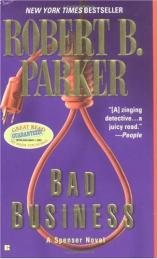Bad Business
Review
Bad Business
One of the finest gifts the first few months of a new year can
bring is a new Spenser novel. Spenser and his creator, Robert B.
Parker, have become, at least in some circles, cultural
institutions. Parker is on record as stating that he will continue
to write Spenser novels as long as people want them, and certainly
there appears to be no flagging of interest in them. He has been
careful to make changes only on minor elements of Spenser's
surroundings, while keeping the primary elements, such as friends
and personalities, pretty much intact. The result is a comfortable
but dependable familiarity that kicks in as soon as one begins a
Spenser novel.
This leaves Parker free to gently experiment with plot lines and
the secondary characters who populate them. Reading a Spenser novel
is like walking once a week down a familiar street where everything
is slightly different: here, there's a new store, there, a fresh
and different coat of paint on some shutters, and there, yes, right
there, a new and interesting face with a story to tell. All of
those elements make the walk worthwhile; so, too, is the annual
visit with Spenser.
BAD BUSINESS, the latest Spenserian saga, finds fiction's most
self-satisfied detective with a new client named Marlene Cowley.
Cowley is a slightly difficult woman, and Parker almost immediately
displays one of his many strengths as he describes Spenser's slow
but steady deflation of her through the use of lighthearted,
deprecating repartee in the course of extracting information.
Cowley retains Spenser because she suspects that her husband,
Trent, is cheating on her and wants, shall we say, to catch the cad
in flagrante delicto. Spenser has an easy enough time
catching Trent in compromising circumstances, but discovers not
only that there is someone shadowing Trent's paramour but also that
Cowley is being shadowed as well! This doesn't just pique Spenser's
curiosity; it impales it.
As he is wont to do in such cases, Spenser is soon operating far
beyond the boundaries of the investigation for which he was
retained. All the investigatory roads lead back to Trent's
employer, Kinergy, more so when Trent is found murdered in his own
office. Trent's position at Kinergy was chief financial officer,
and Spenser is accordingly suspicious that greed, and not passion,
may be the motivating factor behind Trent's unexpected demise. When
a second Kinergy employee is also murdered, Spenser begins kicking
over rocks to see what comes crawling out. Hawk is there to help,
as only Hawk can, and of course Susan Silverman is on hand as well,
acting as soul mate, foil and even occasional Devil's
advocate.
The financial element of BAD BUSINESS also permits Parker to bring
Marty Siegel, the self-styled best accountant in the world, into
the mix to explain some basic but questionable accounting
principles to Spenser. The dialogue between Spenser and Siegel is
some of Parker's best to date, instructive without being
burdensome, and always entertaining. Parker in fact relies a bit
more on dialogue and somewhat less on violence than he has in more
recent novels, which should please those readers with more delicate
sensibilities. Regardless of his underpinnings, however, Parker
never lets his story flag, and when Spenser assembles the cast for
the explanatory denouement, the motive, opportunity and instigator
are at once surprising and obvious.
If Parker is tired of writing Spenser novels, he certainly shows no
signs of it. He continues to surprise, please and entertain. What
more can one ask for? A guest appearance from another Parker
series, perhaps? Well, BAD BUSINESS has one of those too, at least
by reference. Careful readers will be rewarded, if only
momentarily.
Reviewed by Joe Hartlaub on January 21, 2011





